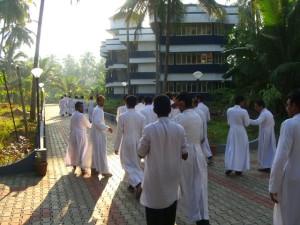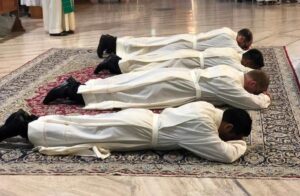VOCATION is a word used to refer to God’s call for each human person
The word, “vocation” is derived from the Latin verb, “vocare”, meaning “to call”. In its secular term, vocation could generally refer to an occupation to which a person is specifically drawn or for which they are suited, trained or qualified. But in the context, the word is often used to imply that God created each individual with a divine purpose and bestowed on him/her gifts and talents oriented toward that specific purpose for which he/she also chooses a particular way of life.
specific purpose for which he/she also chooses a particular way of life.
There is no human person without a vocation. God does not create human beings to populate the earth purposelessly; he does not create us to fill the vacant spaces on earth, neither does he take delight in aimless human existence. God rather has a divine plan, or at best, a divine for all of us. Divinely speaking, he has some works in stock for you just as he does for me. Before he ever thought of creating you, he had already mapped out a master plan for your existence in the world; before you were formed in your mother’s womb, he knew you and called you by name (cf. Jer 1:4-5). Put in different terms, before you were conceived, God had already given you a vocation. Your vocation is what God calls you to do with your life.
Everybody has received a vocation from God; first to “life”, to “holiness”, to “knowledge of God”, to “love of God” and to “service of God and humanity”. The idea of vocation is mostly associated with the latter: service to God and humanity. We all receive a divine call to serve God and humanity through a particular vocational life commitment such as marriage, consecrated life, priestly or deaconate life, and self-consecrated life. Vocations in the church therefore vary between being single, married, consecrated or ordained.
God has therefore given each and everyone of us a particular mission in life. Just as you have yours and I have mine, the way you are to accomplish yours is very different from the way I am expected to accomplish mine. All our God-given vocations are intended to lead us to God. In living our various vocations, we all journey to God in the spirit service as God’s pilgrims on earth. Though we have God as the centre and meeting point of our diverse services, we attempt to journey on this pilgrimage of service through different pathways, namely; single life of holiness, or marriage, or consecrated life, or priesthood.
As we grow and life progresses, God makes our vocations known to us, usually in indirect ways, and more as an invitation than an imposition. God proposes rather than imposing a vocation on us. He allows us the liberty to freely and willingly respond to his call in our lives. We have the duty to discern properly, with the help of the Holy Spirit and our spiritual directors or formators, what God has in stock for us in order to respond accurately to his invitation. Discovering and ultimately following vocation in life gives you the greatest joy and self-fulfillment on the horizontal plane and at the vertical level, God receives the greatest glory for your creation. You thus become a fulfilled responsible creature.
However, we cannot claim sufficiently that we always and automatically know with certitude what God has called us to do in life or what God has given us as our vocation. There is need for us to be guided in the process of attempting to know the kind of life God has prepared for us. This need is the need for vocation discernment. The biblical young Samuel had a divine call, but he was not certain of his call until he was helped by Eli to discern his God-given vocation. This is a depiction that God reveals his will or plan for us gradually, but we could, in our human nature, always make mistakes, and we can even say ‘no’ to God out of ignorance. God is the one who always takes us to
God has given us as our vocation. There is need for us to be guided in the process of attempting to know the kind of life God has prepared for us. This need is the need for vocation discernment. The biblical young Samuel had a divine call, but he was not certain of his call until he was helped by Eli to discern his God-given vocation. This is a depiction that God reveals his will or plan for us gradually, but we could, in our human nature, always make mistakes, and we can even say ‘no’ to God out of ignorance. God is the one who always takes us to where we go and so our concern should only be the concern of “where does he want to take me to or go from where I am?” In taking us to where he wants us to go, he always remains with us so long as we keep close to him in prayer and strive to sincerely live his will. Our vocation therefore can only be affirmed and made explicit to us only through a process of vocation discernment guided in the spirit of prayer.
where we go and so our concern should only be the concern of “where does he want to take me to or go from where I am?” In taking us to where he wants us to go, he always remains with us so long as we keep close to him in prayer and strive to sincerely live his will. Our vocation therefore can only be affirmed and made explicit to us only through a process of vocation discernment guided in the spirit of prayer.
